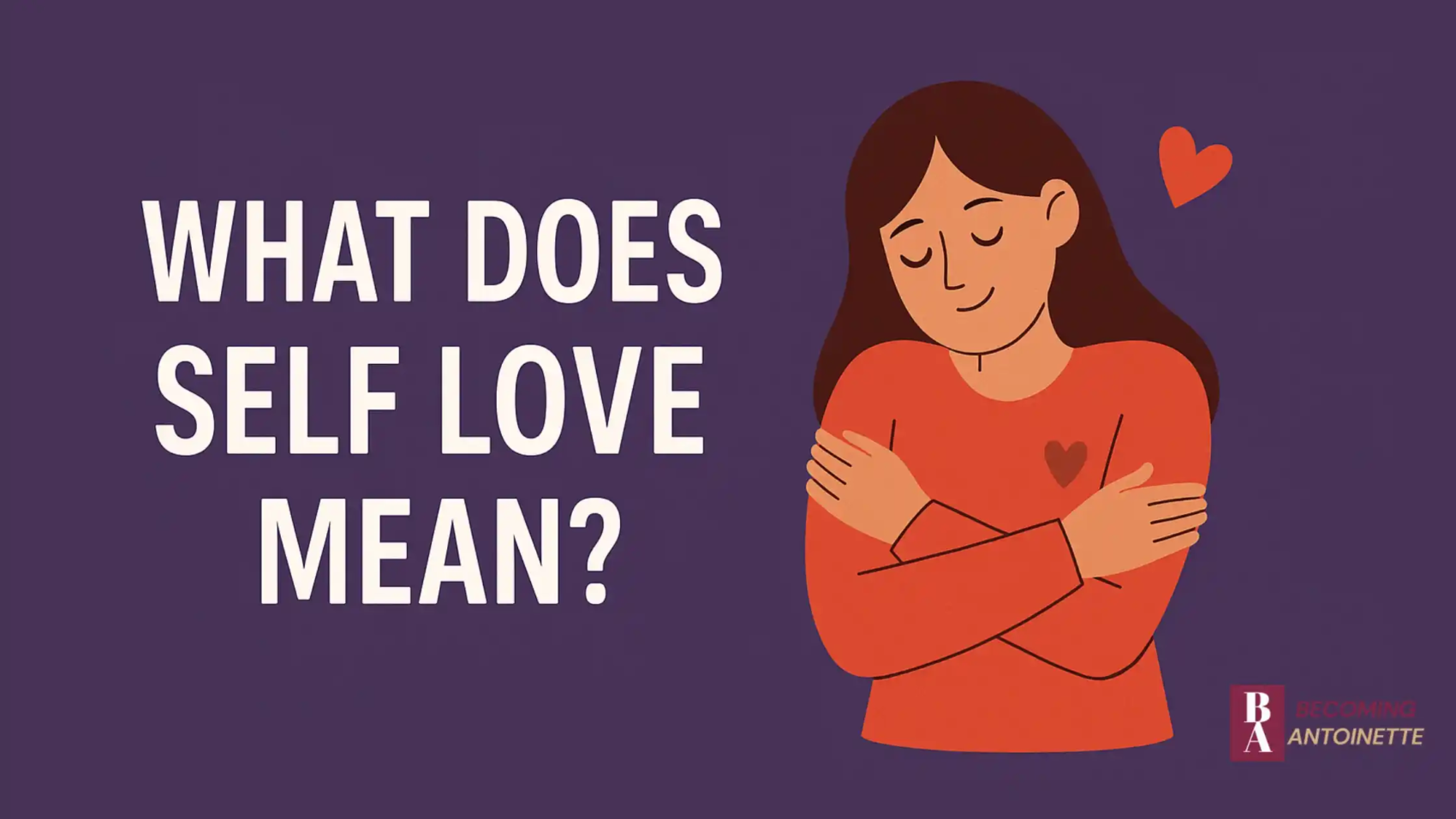I remember the day I first really asked myself, “what does self love mean?” I was sitting on my living room floor, surrounded by sticky notes of goals—lose weight, earn that promotion, master a new skill—yet felt hollow inside. Over the years, I’ve learned that self love meaning isn’t just ticking boxes; it’s a radical act of caring for yourself when life feels messy. Pull up a chair, and let’s dive into fresh perspectives, surprising research, and hands‑on tips you won’t find in your average self‑help article.
For deeper guidance anytime, You can always circle back to the guide which I have written based on my personal journey, Self Love: The Ultimate Guide for Women.
What Does Self Love Mean? A Fresh Take
Most definitions skim the surface: bubble baths, face masks, spa days. While those can be nice, what does self love mean at its core? I’ve come to see it as:
- Radical Acceptance of Your Flaws: Not just tolerating quirks, but celebrating them as unique signature traits.
- Micro‑Resets Throughout the Day: Think of self love as 5‑minute pit‑stops—tiny mindful breaks, not just Sunday self‑care marathons.
- EQ Over IQ: Building emotional agility: noticing anger, anxiety, or sadness, then choosing a compassionate response.
These nuances lifted me from surface‑level self‑care to deep, transformative self‑kindness.
The Psychology of Self Love
Why Our Brains Resist It
Surprisingly, our brains often treat self‑soothing as laziness. Evolution wired us to prioritize threats over rest. Yet, studies on self‑compassion show that deliberate self‑care actually lowers the heart rate and calms the amygdala—our emotional alarm system. Once I realized I wasn’t being “lazy” for taking breaks, I made them non‑negotiable.
Harnessing Neuroplasticity
Few people know how self‑kindness actually re‑wires neural pathways. By consistently asking what does self love mean when facing setbacks, I learned to catch negative loops early. Each time I paused to say, “This is hard—and I’m still here,” my brain reinforced a new, gentler default.
Why Is Self Love Important?
The Ripple Effect on Productivity
Here’s a surprise: practicing self‑love boosts creativity by up to 25%. A recent occupational psychology study found that workers who scheduled daily “emotional maintenance” reported sharper focus and more innovative ideas¹. After adding a five‑minute midday pause to my routine, I went from battling afternoon slumps to finishing projects ahead of deadlines.
Strengthening Relationship Resilience
When I learned why is self love important, I noticed my friendships deepened. Rather than reacting defensively when someone disagreed, I’d thought, “They see me, imperfect—and still care.” That mindset shift came from valuing my own worth first.
What Is It Called When You Love Yourself?
You’ll hear terms like self-esteem, self-worth, and self-compassion. Here’s how I distinguish them:
- Self-Esteem: My confidence in tackling challenges—like finally learning to swim at age 30.
- Self-Worth: Recognizing my inherent value, even on bad days when nothing seems to go right.
- Self-Compassion: The gentle voice reminding me “I’m doing my best” when I blow a deadline.
All three interlock. When I asked what does self love mean to me, I realized it’s weaving these threads into everyday life.
Self Love Examples You Haven’t Tried
The “Mirror Note” Technique
Instead of standard affirmations, I tape a sticky note on my mirror each morning with a personal growth reflection—“I handled yesterday’s argument with grace” or “I showed up for myself by resting.” Looking at my own handwriting makes it feel far more authentic.
Sensory Self‑Love Rituals
Our senses ground us. I discovered that I’m a scent‑driven person. Now, I keep a small vial of lavender oil on my desk—two deep inhales reset my mood faster than scrolling social media.
Reverse Gratitude Journaling
Rather than listing what I’m grateful for, I write what I forgive myself for—missed workouts, harsh words, procrastination. That practice dissolves shame and builds resilience.
Importance of Self Love: Quick Reference
| Practice | Unique Twist | Benefit |
| Mirror Notes | Daily, handwritten reflections | Feels personal; reinforces growth |
| Sensory Rituals | Inhale a favorite scent for 10 seconds | Instant mood reset |
| Reverse Gratitude | Forgiveness journal entries | Reduces shame; boosts self‑compassion |
| Micro Resets | 5‑minute mindful breaks every 90 minutes | Maintains focus; lowers stress levels |
| “Compassionate Question” | Ask, “What would I advise my best friend right now?” | Shifts self‑criticism to encouragement |
How to Cultivate Self Love—My 5‑Step Practice
- Identify Your Inner Critic’s Voice: Catch that first critical thought and label it (“There’s that Judgment Jane again”).
- Apply the “Compassionate Question”: What advice would you give a dear friend in this situation?
- Schedule Micro Resets: Use alarms or apps to remind yourself to pause—no screens, just breath.
- Celebrate Tiny Wins: Did you speak up for yourself in a meeting? High‑five your reflection!
- Invest in Learning: I turned to relaxation techniques that teach breath‑control and visualization—tools I now share in my coaching sessions.
H2: Ready to Deepen Your Self Love Journey?
Over the past decade, I’ve guided hundreds of women through breakthrough moments—shifting from self-criticism to genuine self‑compassion. If you’re wondering how personalized support can accelerate your growth, I offer one‑on‑one self‑love coaching where we’ll tailor these neuro‑hacks, mirror‑note exercises, and micro‑resets specifically for your life.
Claim your discovery session and let’s explore how self‑love coaching can help you finally answer what does self love mean for you. Book your spot here and begin the transformation today!
Frequently Asked Questions
What does self love mean when I feel too busy?
It means reframing self‑care as productivity fuel. Even a one‑minute breath break resets your brain.
How can I practice self love examples at work?
Try the “Stand‑and‑Stretch”: every hour, stand, stretch arms overhead, and acknowledge one thing you did well that hour.
Why is self love important for mental health?
Because self‑kindness lowers stress hormones and bolsters resilience—scientifically shown in psychiatric research.
Can daily micro‑resets really make a difference?
Yes! Consistent tiny breaks compound into major stress reduction and improved clarity over weeks.


Leave Your Comment